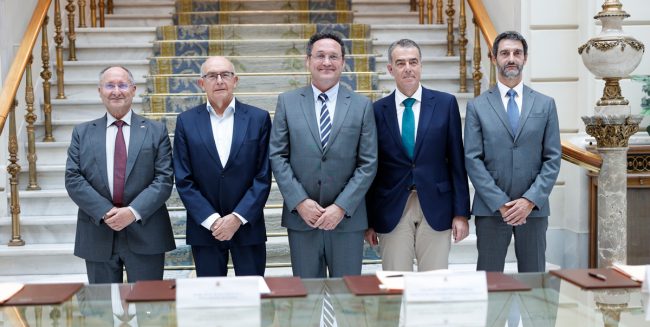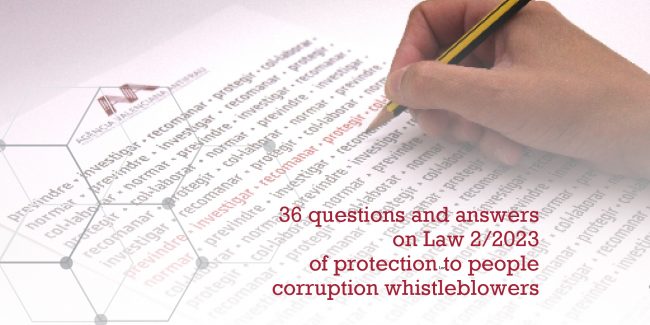BASIC QUESTIONS ABOUT THE LAW What is the objective of Law 2/2023, of February 20, regulating the protection of people who report on regulatory violations and the fight against corruption? Its objective is to protect people who report or denounce violations in their workplace from retaliation they may suffer. The Law transposes Directive 2019/1937 of the European Parliament on the protection of persons who report violations of Union Law. Law 11/2016 creating the Agency for the Prevention and Fight against Fraud and Corruption of the Valencian Community, anticipated the Directive, creating an external complaints mailbox open to all citizens and a statute of protection of people who denounce, whether natural or legal persons. Who can report or denounce an irregularity in their workplace? Any person linked by a labor or professional relationship may report to the Independent Informant Protection Authority (AIPI), which has not yet been created, or to the corresponding authorities or autonomous bodies. In the case of the Valencian Community, the competent authority is the Valencian Anti-Fraud Agency. What type of information or complaints are included within the scope of application of the Law and give the right to protection? Actions or omissions that may constitute a serious or very serious criminal or administrative offense. For example: passing the questions on an exam, manipulating a contract, building where you can’t, accessing a grant without having the requirements… In the case of the Valencian Anti-Fraud Agency, these are those facts or conduct that may constitute corruption, fraud, administrative irregularities, conduct constituting an administrative or disciplinary offence, and conduct or activities that are reprehensible for being contrary to integrity and public ethics. Does the Valencian Antifraud Agency have powers in the private sector? It could only have said competence if Law 11/2016 creating the Agency is modified, expanding its scope of action. Therefore, for the private sector, the competent body is the Independent Informant Protection Authority (AIPI), which has not yet been created. What are the ways and means to report or denounce an infringement in accordance with Law 2/2023? Through the internal channel that each entity must have, or through the external channel, which in the case of the Valencian Community is that of the Valencian Antifraud Agency. The Law allows the whistleblower to choose between the internal or external channel, depending on the circumstances and the risks of reprisals that he considers. The complaint may be anonymous or identified, and may be made by any means: written, verbal, by email, postal mail, voice mail, etc. Who can be reporting persons according to Law 2/2023? Law 2/2023 uses the term “informant” as a synonym for whistleblower to refer to people in the public or private sector who communicate or reveal information about irregularities of which they are aware in their professional or work environment. Are included: People who work in public administrations regardless of their employment relationship (career officials, interim, labor, temporary…) People who work in the private sphere. People who are doing internships, interns, in training or who are participating in a selection process. People who work for companies related to the administration, whether they are contractors, subcontractors, suppliers, etc. In any case, these people who report violations must report in accordance with the requirements of the Law and have reasonable grounds to believe that the information they are providing is true. Can I go to the external reporting channel or should I first report through the internal channel? The internal channel should be used preferentially, since a diligent and effective action within the organization itself could paralyze the harmful consequences. However, the Law allows the whistleblower to choose the internal or external channel, depending on the circumstances and the risks of reprisals that he considers. In any case, the AVAF is the external channel that may be used in accordance with the provisions of Law 2/2023 and in its regulatory regional regulations. What are the support measures established by Law 2/2023 for the person who denounces or informs? Free information and advice on the procedures and resources available, protection against retaliation and the rights of the affected person. Effective assistance by the competent authorities before any authority involved in their protection against retaliation, including the certification that they can avail themselves of protection under this law. Legal assistance in criminal proceedings and cross-border civil proceedings in accordance with community regulations. Financial and psychological support, exceptionally, after assessing the circumstances. All this, regardless of the assistance that may correspond according to Law 1/1996 on free legal assistance, for the representation and defense in judicial proceedings derived from the presentation of the communication or public disclosure. Who can access the protection measures included in the Law? In addition to the informants or denouncers, those related to them who may be harmed or retaliated against, such as family members or co-workers, will be able to access. What about retaliation? Acts of retaliation, including threats and attempted retaliation, are expressly prohibited. Retaliation is understood as any act or omission prohibited by Law, or that directly or indirectly involves unfavorable treatment that places the people who suffer it at a disadvantage with respect to another in the labor or professional context, solely because of their status as informants. What are the most common reprisals? Opening of disciplinary files and dismissal. Demotion or denial of promotions and substantial modifications of working conditions. Damages, including those of a reputational nature, or economic losses, coercion, intimidation, harassment or ostracism. Denial or cancellation of licences, permits or training. Discrimination, or unfavorable or unfair treatment. What are the protection measures against retaliation? The best protection is anonymity. The Law requires the creation and implementation of secure channels that guarantee confidentiality, admitting both anonymous and identifying complaints. The people who communicate this information are not liable, provided that access to the information does not constitute a crime and except for legal liabilities that may arise. However, the protection does not exempt the complainant from the responsibilities that may have been incurred for events other than the complaint.…




